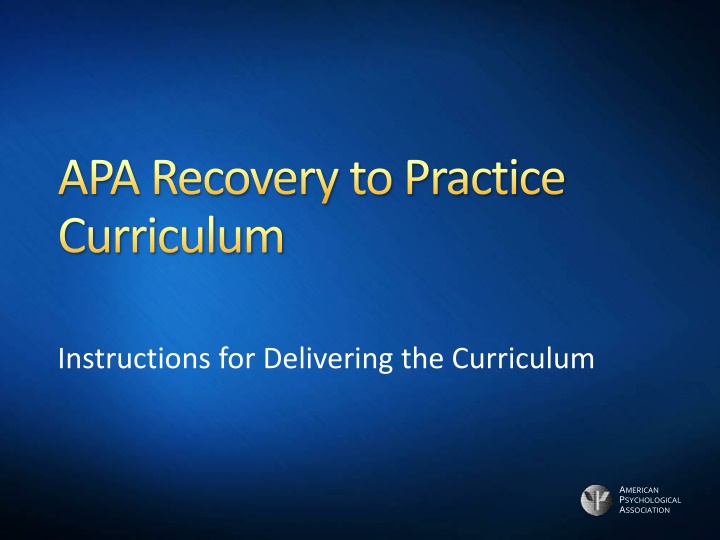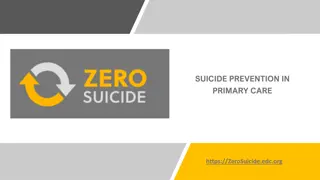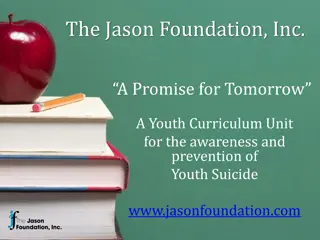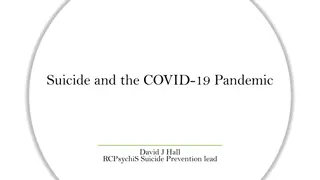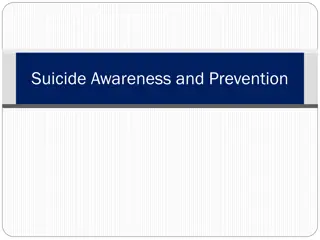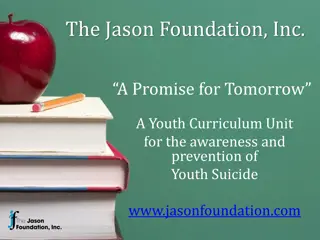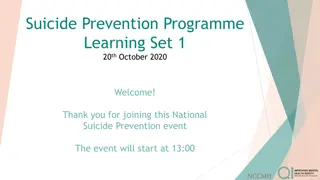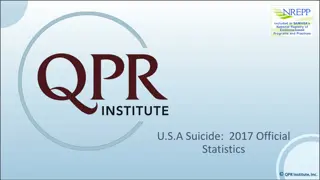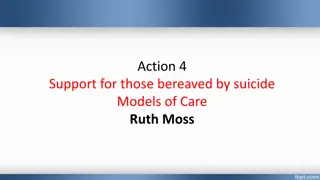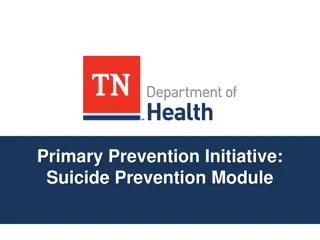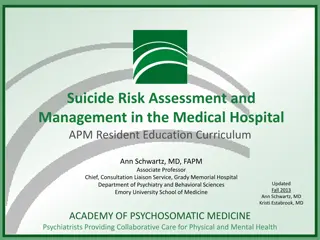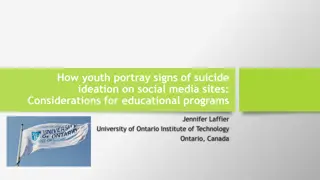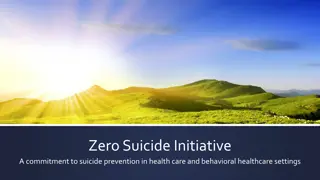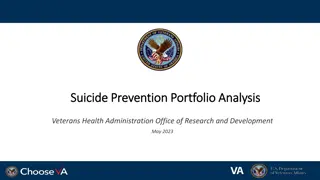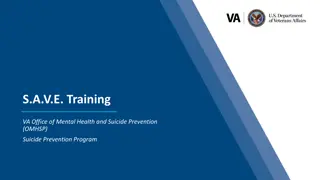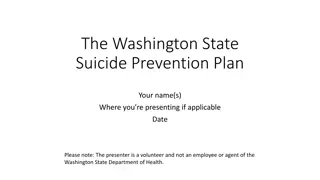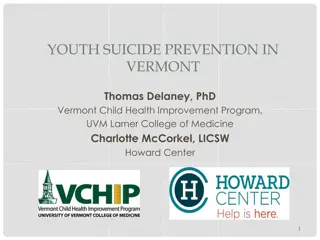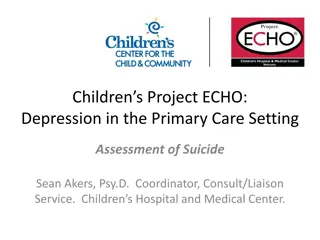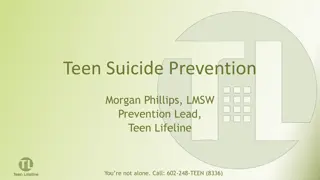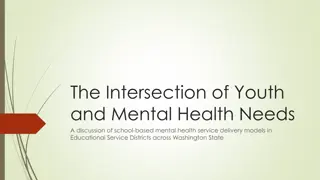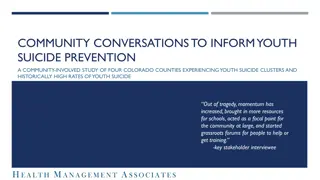Addressing Youth Suicide: Training & Prevention Efforts
This content sheds light on the silent epidemic of youth suicide, emphasizing the need for prevention and training efforts. It discusses the impact of suicide on youth, signs of concern, and the role of school personnel in tackling this issue. The history of the Jason Flatt Act and the requirements it entails for suicide prevention training in schools are also highlighted.
Download Presentation

Please find below an Image/Link to download the presentation.
The content on the website is provided AS IS for your information and personal use only. It may not be sold, licensed, or shared on other websites without obtaining consent from the author.If you encounter any issues during the download, it is possible that the publisher has removed the file from their server.
You are allowed to download the files provided on this website for personal or commercial use, subject to the condition that they are used lawfully. All files are the property of their respective owners.
The content on the website is provided AS IS for your information and personal use only. It may not be sold, licensed, or shared on other websites without obtaining consent from the author.
E N D
Presentation Transcript
APA Recovery to Practice Curriculum Instructions for Delivering the Curriculum AMERICAN PSYCHOLOGICAL ASSOCIATION
Background People with serious mental illnesses (SMI) can and do recover from the devastating effects of these illnesses Psychologists are crucial to helping individuals achieve recovery and attain a satisfying and productive life, BUT Psychologists do not receive the specialized training needed for this work in existing training programs This new curriculum is intended to fill this void The curriculum is aimed at training psychologists in the concepts and practices needed to assist those with serious mental illnesses recover and attain their full functional capacity The overarching goal of the APA Recovery to Practice Curriculum is to provide doctoral level psychology students with: Knowledge of the concept of recovery from severe mental illness and Knowledge of rehabilitation assessments and evidence based and emerging practices to assist individuals with severe mental illnesses to achieve their goals and full potential. These are known as psychosocial rehabilitation (PSR) interventions AMERICAN PSYCHOLOGICAL ASSOCIATION
Background, contd SAMHSA awarded APA a contract to develop a training curriculum in recovery principles and psychosocial rehabilitation practices for the profession of psychology The curriculum was developed in 2011 2012 and pilot tested in 2012 2013 The curriculum has 15 topical modules; each is based on the latest scientific literature Each module reviews the literature, includes a short learning quiz, and includes a learning exercise designed to reinforce the content of the module The curriculum provides training for psychologists in the latest assessment and intervention methods for this population The curriculum is being released to doctoral programs, internship and post doctoral training sites AMERICAN PSYCHOLOGICAL ASSOCIATION
Curriculum Modules Instruction Module 1. Introduction to Recovery 2. Recovery, Health Reform and Psychology 3. Assessment 4. Partnership and Engagement 5. Person Centered Planning 6. Health Disparities 7. Interventions I 8. Interventions II 9. Interventions III 10. Forensic and Related Issues I 11. Forensic and Related Issues II 12. Community Inclusion 13. Peer Delivered Services 14. Systems Transformation 15. Scientific Foundations AMERICAN PSYCHOLOGICAL ASSOCIATION
Incorporating Consumers as Teachers It is important that individuals who have experienced serious mental illness are incorporated into the delivery of each of the curriculum modules. It is strongly encouraged that consumers be an integral part of the teaching experience. This can be accomplished through: Having consumers serve as co-trainers Inviting consumers to classes to be guest speakers Showing films or other media that have been produced for teaching the experiences of consumers AMERICAN PSYCHOLOGICAL ASSOCIATION
Important Considerations In order to ensure adequate preparation and support for participants, it may be important to provide advance training and after class debriefing, especially where issues related to trauma have been raised and discussed. Everyone should note the importance of establishing an environment where everyone feels comfortable and safe sharing information. Confidentiality must be assured for all information that is shared and any discussions that take place. No personal information should be shared with anyone who is not part of the class and discussions about personal information that may have been disclosed in the class should not occur outside the classroom. Information that is shared should never be used to affect an individual s status in the program. AMERICAN PSYCHOLOGICAL ASSOCIATION
Citation for this Module: American Psychological Association & Jansen, M. A. (2014). Instructions for Delivering the Curriculum. Reframing Psychology for the Emerging Health Care Environment: Recovery Curriculum for People with Serious Mental Illnesses and Behavioral Health Disorders. Washington, DC: American Psychological Association. www.apa.org/pi/rtp Citation for the full Curriculum: American Psychological Association & Jansen, M. A. (2014). Reframing Psychology for the Emerging Health Care Environment: Recovery Curriculum for People with Serious Mental Illnesses and Behavioral Health Disorders. Washington, DC: American Psychological Association. mjansen@bayviewbehavioral.org or jansenm@shaw.ca AMERICAN PSYCHOLOGICAL ASSOCIATION August, 2014
APA Recovery to Practice Curriculum 1. Introduction to Recovery AMERICAN PSYCHOLOGICAL ASSOCIATION
Introduction to Recovery Based Psychological Practice Historical Context Until the mid-1970s, conventional wisdom regarded a serious mental illness as a deteriorating, debilitating disease Repeated hospitalizations Focus on symptom reduction Power was in the hands of the provider Recovery from serious mental illness was thought NOT possible We now know recovery and return to a satisfying life is possible with appropriate rehabilitation interventions AMERICAN PSYCHOLOGICAL ASSOCIATION
Introduction to Recovery Based Psychological Practice Evolution of the Recovery Movement AMERICAN PSYCHOLOGICAL ASSOCIATION
Introduction to Recovery Based Psychological Practice What is Recovery? A process of change through which individuals improve their health and wellness, live a self-directed life, and strive to reach their full potential (Substance Abuse and Mental Health Services Administration, 2012) Recovery is what people with illnesses and disabilities do (Anthony, 2002) Treatment, case management, support and rehabilitation are the things that practitioners do to facilitate recovery (Anthony, 2002) AMERICAN PSYCHOLOGICAL ASSOCIATION
Introduction to Recovery Based Psychological Practice 10 Guiding Principles of Mental Health Recovery 1. 2. Self-Direction Individualized and Person-Centered Empowerment Holistic Non-Linear 6. 7. 8. 9. 10. Hope Strengths-Based Peer Support Respect Responsibility 3. 4. 5. AMERICAN PSYCHOLOGICAL AMERICAN PSYCHOLOGICAL ASSOCIATION ASSOCIATION
Introduction to Recovery Based Psychological Practice Challenges Mental Health System Practitioners have low expectations of individuals with serious mental illnesses Person with Serious Mental Illness Stigmatizing diagnoses that imply permanent disability or impairment Practitioners are not appropriately or adequately trained re symptoms and behaviors Recovering from iatrogenic effects of mental health treatment system Detrimental effects to one s relationships, ability to learn or work, self-esteem, identity and confidence Lack of knowledge of effective interventions AMERICAN PSYCHOLOGICAL ASSOCIATION
Introduction to Recovery Based Psychological Practice Steps Recognize and embrace the philosophy of recovery Get training in effective psychosocial rehabilitation interventions Move from deficit-based to asset-based perspectives Ensure that each individual is the decision maker for his or her own service delivery: Nothing about us without us! Ensure community and social inclusion AMERICAN PSYCHOLOGICAL ASSOCIATION
Citation for this Module: American Psychological Association & Jansen, M. A. (2014). Introduction to Recovery Based Psychological Practice. Reframing Psychology for the Emerging Health Care Environment: Recovery Curriculum for People with Serious Mental Illnesses and Behavioral Health Disorders. Washington, DC: American Psychological Association. www.apa.org/pi/rtp Citation for the full Curriculum: American Psychological Association & Jansen, M. A. (2014). Reframing Psychology for the Emerging Health Care Environment: Recovery Curriculum for People with Serious Mental Illnesses and Behavioral Health Disorders. Washington, DC: American Psychological Association. mjansen@bayviewbehavioral.org or jansenm@shaw.ca August, 2014 AMERICAN PSYCHOLOGICAL ASSOCIATION
APA Recovery to Practice Curriculum 2. Recovery, Health Reform and Psychology AMERICAN PSYCHOLOGICAL ASSOCIATION
The Recovery Movement: Role of Psychologists and Health Care Reform Psychologists at the Evolution of the Recovery Movement Visionaries Beginning in mid-1970s, psychologists began writing about and researching the concept of recovery from a serious mental illness Psychologists with lived experiences contributed in developing the concept of recovery Research Shows Between 46% - 75% of persons recover from a serious mental illness and successfully contribute to the community AMERICAN PSYCHOLOGICAL ASSOCIATION
The Recovery Movement: Role of Psychologists and Health Care Reform Contributions Both psychologists and individuals with serious mental illnesses have worked together to: Lead efforts to conduct research on recovery outcomes Develop and test instruments to assess functional skills Develop and test rehabilitation interventions to assist the recovery process Work with State and Federal governmental agencies to promote and facilitate the recovery process AMERICAN PSYCHOLOGICAL ASSOCIATION
The Recovery Movement: Role of Psychologists and Health Care Reform Traditional versus Recovery Oriented Roles of Psychologists as Clinician Researcher Program Manager Administrator / Policy Maker The roles are the same but the way psychologists function in those roles is very different! AMERICAN PSYCHOLOGICAL ASSOCIATION
The Recovery Movement: Role of Psychologists and Health Care Reform Examples of Health Discrepancies for Persons with a Serious Mental Illness One in four uninsured adult Americans has a mental disorder, substance use disorder, or both (National Alliance on Mental Illness and National Council for Community Behavioral Healthcare, 2008) On average, adults with a serious mental illness die 25 years sooner than those who do not have a mental illness (National Association of State Mental Health Program Directors Medical Directors Council, 2006) AMERICAN PSYCHOLOGICAL ASSOCIATION
The Recovery Movement: Role of Psychologists and Health Care Reform Examples of Health Discrepancies for Persons with a Serious Mental Illness In 2002, mental illness and substance use disorders led to $193 billion in lost productivity more than the gross revenue of 499 of the Fortune 500 companies and by 2013, this figure is estimated to rise to more than $300 billion (Kessler, 2008) Almost one in four stays in U.S. community hospitals involved depression, bipolar disorder, schizophrenia, and other mental health and substance use disorders (Agency for Healthcare Research and Quality, 2007) Health care reform legislation was absolutely necessary! AMERICAN PSYCHOLOGICAL ASSOCIATION
The Recovery Movement: Role of Psychologists and Health Care Reform Health Care Reform: Affordable Care Act (ACA), 2010 Immediate Benefits for People with a Serious Mental Illness: Individuals may be a part of their integrated primary care or behavioral health care team Underinsured and uninsured populations will have access to general medical care Access to affordable psychotherapy and psychiatric services which typically have been difficult to obtain, especially with pre-existing condition Ability to insure children under their parents plans until the age of 27 Employers can no longer deny coverage to individuals with serious mental illnesses AMERICAN PSYCHOLOGICAL ASSOCIATION
The Recovery Movement: Role of Psychologists and Health Care Reform ACA and Opportunities for Psychologists Person-centered integrated treatment models that integrate psychologists into primary care, e.g., medical homes Ability to provide most appropriate interventions on time Increased use of evidence based medicine Demonstrate value of interventions through outcomes Must design, deliver, and evaluate interventions for greater public reimbursement AMERICAN PSYCHOLOGICAL ASSOCIATION
Citation for this Module: American Psychological Association & Jansen, M. A. (2014). The Recovery Movement: Role of Psychologists and Health Care Reform. Reframing Psychology for the Emerging Health Care Environment: Recovery Curriculum for People with Serious Mental Illnesses and Behavioral Health Disorders. Washington, DC: American Psychological Association. www.apa.org/pi/rtp Citation for the full Curriculum: American Psychological Association & Jansen, M. A. (2014). Reframing Psychology for the Emerging Health Care Environment: Recovery Curriculum for People with Serious Mental Illnesses and Behavioral Health Disorders. Washington, DC: American Psychological Association. mjansen@bayviewbehavioral.org or jansenm@shaw.ca August, 2014 AMERICAN PSYCHOLOGICAL ASSOCIATION
APA Recovery to Practice Curriculum 3. Assessment AMERICAN PSYCHOLOGICAL ASSOCIATION
Assessment The cornerstone of any good treatment plan is a thorough assessment of a person s strengths and weaknesses (Silverstein, 2000) AMERICAN PSYCHOLOGICAL ASSOCIATION
Assessment every individual, no matter how severe the person s illness might be, has the capacity to continue to learn and develop. (Davidson, et al., 2008) Skills Talents Personal virtues & traits Interpersonal skills Knowledge gained from adversities, occupational or parenting roles Cultural knowledge Family stories Spirituality AMERICAN PSYCHOLOGICAL AMERICAN PSYCHOLOGICAL ASSOCIATION ASSOCIATION
Assessment Traditional Clinical Assessments Strengths Based Ecological Assessments Psychiatric diagnosis Cultural knowledge Problematic symptoms and behaviors Family stories Spirituality Failures in social, educational & vocational pursuits Knowledge gained from adversities, occupational or parenting roles Difficulties in life AMERICAN PSYCHOLOGICAL ASSOCIATION AMERICAN PSYCHOLOGICAL ASSOCIATION
Assessment Components of a Strengths Based, Ecological & Functional Assessment Continual process of seeking information Information gathered from several life domains Cultural influences are incorporated Focused on positive aspects of a person s life Develops skills and resources needed to facilitate recovery AMERICAN PSYCHOLOGICAL ASSOCIATION
Assessment Strengths Based Assessment: Approaches each person from the standpoint of determining: Capabilities Accomplishments Potential Considers positive factors in the person s surrounding environment: Natural support network (family strengths, community supports, social service system network) Each person has the potential for future accomplishments that will facilitate continuing to attain the life he or she wishes to achieve AMERICAN PSYCHOLOGICAL ASSOCIATION
Assessment Some Questions to Ask: What do you call your challenge and what caused it? What are you most proud of in your life? What is one thing you would NOT change about yourself? What are the most important things to you when deciding where to live? With what cultural group(s) do you identify? What kinds of things have you liked learning about? What are your hopes and dreams for the future? Have you ever been treated inappropriately or in ways that were harmful to you? What are the things that matter most to you? AMERICAN PSYCHOLOGICAL ASSOCIATION
Citation for this Module: American Psychological Association & Jansen, M. A. (2014). Assessment. Reframing Psychology for the Emerging Health Care Environment: Recovery Curriculum for People with Serious Mental Illnesses and Behavioral Health Disorders. Washington, DC: American Psychological Association. www.apa.org/pi/rtp Citation for the full Curriculum: American Psychological Association & Jansen, M. A. (2014). Reframing Psychology for the Emerging Health Care Environment: Recovery Curriculum for People with Serious Mental Illnesses and Behavioral Health Disorders. Washington, DC: American Psychological Association. mjansen@bayviewbehavioral.org or jansenm@shaw.ca August, 2014 AMERICAN PSYCHOLOGICAL ASSOCIATION
APA Recovery to Practice Curriculum 4. Partnership and Engagement AMERICAN PSYCHOLOGICAL ASSOCIATION
Engaging People as Partners The Need to Engage People with Serious Mental Illnesses in the Service Delivery System Improve access to services Potential to minimize the effect of crises Potential to benefit from the expertise people have about the illness and need for services Potential therapeutic benefits Advantages of having people with lived experience involved with prioritizing and conducting research Benefits of involvement in staff selection and training AMERICAN PSYCHOLOGICAL ASSOCIATION
Engaging People as Partners Reasons People are Reluctant to Engage the Mental Health System From the System Itself: Prior negative experiences and possible trauma From the Individual: Severity of illness Multiple social barriers: Poverty, homelessness, criminal history, ill physical health, social stigma, poor social skills, and social isolation. Need wide range of services AMERICAN PSYCHOLOGICAL AMERICAN PSYCHOLOGICAL ASSOCIATION ASSOCIATION
Engaging People as Partners Historical and Cultural Barriers Immigrant Populations Language barriers Social stigma of Behavioral Health problems / Religious beliefs on the origin of mental illness Cultural beliefs and practices related to decision making Distrust of authority / Previous abuse from those in authority African Americans Distrust of authority and systems History of slavery and discrimination Poverty Poor education systems High incarceration rates for young males AMERICAN PSYCHOLOGICAL AMERICAN PSYCHOLOGICAL ASSOCIATION ASSOCIATION
Engaging People as Partners Overcoming Barriers Through Assertive Outreach Components of Assertive Outreach Meeting the person on his or her own terms, including times and locations Offering a range of services, including crisis intervention Identified person available 24 hours per day Risk management approach that offers safety Pay attention to social factors Supported access to mainstream services Peer support and encouragement Offering daytime activities Treating persons as equals with dignity and respect Help with finance and benefits Finding suitable accommodations AMERICAN PSYCHOLOGICAL ASSOCIATION
Engaging People as Partners Benefits of Partnering with People with Serious Mental Illnesses Minimizing the effects of crises Determining which services are best Potential therapeutic benefits Research participation AMERICAN PSYCHOLOGICAL AMERICAN PSYCHOLOGICAL ASSOCIATION ASSOCIATION
Engaging People as Partners Challenges Cultural factors Lack of services and resources for individuals Lack of system commitment Lack of training for psychologists and other professionals Threatening the expertise of psychologists AMERICAN PSYCHOLOGICAL ASSOCIATION
Citation for this Module: American Psychological Association & Jansen, M. A. (2014). Partnership and Engagement. Reframing Psychology for the Emerging Health Care Environment: Recovery Curriculum for People with Serious Mental Illnesses and Behavioral Health Disorders. Washington, DC: American Psychological Association. www.apa.org/pi/rtp Citation for the full Curriculum: American Psychological Association & Jansen, M. A. (2014). Reframing Psychology for the Emerging Health Care Environment: Recovery Curriculum for People with Serious Mental Illnesses and Behavioral Health Disorders. Washington, DC: American Psychological Association. mjansen@bayviewbehavioral.org or jansenm@shaw.ca AMERICAN PSYCHOLOGICAL ASSOCIATION August, 2014
APA Recovery to Practice Curriculum 5. Person Centered Planning AMERICAN PSYCHOLOGICAL ASSOCIATION
Person Centered Planning Concept of Person Centered Planning IN THE DRIVER S SEAT The individual with lived experience is in the driver s seat Based on seeing and working with people in a completely different manner Balance of power is shifted and decision making is shared Individuals are fully integrated into the communities of their choice AMERICAN PSYCHOLOGICAL AMERICAN PSYCHOLOGICAL ASSOCIATION ASSOCIATION
Person Centered Planning What Does Person Centered Planning Mean? The right to make choices for oneself is a fundamental human right: Not contingent on freedom from symptoms Every person has the right to be involved in, and make decisions about services received, how and where to live, with whom to associate, etc. Person centered planning is the operationalization of respect for a person s right to make these choices AMERICAN PSYCHOLOGICAL ASSOCIATION
Person Centered Planning Importance of Culture Culture impacts substantially on the planning process, decisions about services, and recovery process: Religious views Beliefs about mental illness - its etiology and its acceptability Views regarding a person s right to make choices as opposed to having those choices made for him or herself Language barriers affect ability to communicate the many important facets of a person s life and background All impact the planning process and recovery outcome AMERICAN PSYCHOLOGICAL ASSOCIATION
Person Centered Planning Concept of Person Centered Planning AMERICAN PSYCHOLOGICAL ASSOCIATION
Person Centered Planning Challenges Person with Serious Mental Illness Mental Health System Individuals are reluctant to ask for, or are not ready to participate in services Providers tend to resist change and find reasons (excuses) for maintaining the status quo May not be able to identify desired goals Lack of willingness to change attitudes, biases and beliefs about individuals with serious mental illness Uncomfortable with making choices and translating needs and wants into supporting services Inability to adapt to new way of providing services AMERICAN PSYCHOLOGICAL ASSOCIATION
Person Centered Planning Process Get to know the individual Start to build a relationship Ask: Who would you like involved in this process? INITIAL MEETING Strengths & Challenges Community / Environmental Resources Current Living Situation / Current Mental Health Status ASSESSMENT Initiated by the individual with lived experience Goals / Objectives Interventions CREATING THE PLAN Led by the Person Served Reviewing Progress / Updating Plans Alterations as needed EVALUATING PROGRESS Individual indicates a readiness to move Planning occurs as needed / wanted by individual MAKING TRANSITIONS AMERICAN PSYCHOLOGICAL ASSOCIATION
Person Centered Planning Keys to Person Centered Planning The individual with lived experience and the person s key supporters are the most important decision makers in the process Cultural factors must be addressed in the planning process Collaborative and interdisciplinary teams are necessary Organizations must shift the way individuals with serious mental illnesses are viewed at every level of the system - no more Us versus them philosophy! AMERICAN PSYCHOLOGICAL ASSOCIATION
Citation for this Module: American Psychological Association & Jansen, M. A. (2014). Person Centered Planning. Reframing Psychology for the Emerging Health Care Environment: Recovery Curriculum for People with Serious Mental Illnesses and Behavioral Health Disorders. Washington, DC: American Psychological Association. www.apa.org/pi/rtp Citation for the full Curriculum: American Psychological Association & Jansen, M. A. (2014). Reframing Psychology for the Emerging Health Care Environment: Recovery Curriculum for People with Serious Mental Illnesses and Behavioral Health Disorders. Washington, DC: American Psychological Association. mjansen@bayviewbehavioral.org or jansenm@shaw.ca August, 2014 AMERICAN PSYCHOLOGICAL ASSOCIATION
APA Recovery to Practice Curriculum 6. Health Disparities AMERICAN PSYCHOLOGICAL ASSOCIATION
